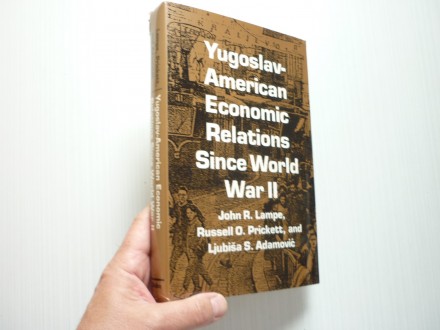Yugoslav-American Economic Relations Since World War II
| Cena: |
| Želi ovaj predmet: | 4 |
| Stanje: | Nekorišćen |
| Garancija: | Ne |
| Isporuka: | Pošta Post Express Lično preuzimanje Organizovani transport: 180 din |
| Plaćanje: | Tekući račun (pre slanja) PostNet (pre slanja) Lično |
| Grad: |
Smederevska Palanka, Smederevska Palanka |
ISBN: Ostalo
Godina izdanja: 1990
Jezik: Engleski
Autor: Strani
John Lampe, Russell Prickett, Ljubiša Adamović
YUGOSLAV AMERICAN ECONOMIC RELATIONS SINCE WORLD WAR II
Duke University Press Books, 1990.
249 Pages, Hardcover, udžbenički format.
Yugoslav-American Economic Relations Since World War II provides a comprehensive study of the economic relations between the United States and Yugoslavia over the past four decades. The authors recount how Yugoslavia and the United States, despite great differences in size, wealth, and ideology, overcame early misunderstandings and confrontations to create a generally positive economic relationship based on mutual respect. The Yugoslav experience demonstrated, the authors maintain, that existence outside the bloc was possible, profitable, and nonthreatening to the Soviet Union.
The authors describe American official and private support for Yugoslavia’s decades-long efforts at economic reform that included the first foreign investment legislation in 1967 and the first introduction of convertible currency in 1990 for any communist country. Also examined are the origins of Yugoslavia’s international debt crisis of the early 1980s and the American role in the highly complex multibillion-dollar international effort that helped Yugoslavia surmount that crisis.
In the past, U.S. support for the Yugoslav economy was proffered in part, the authors claim, to counter perceived threats from the Soviet Union and its allies. This may have enabled Yugoslavia to avoid some of the hard but necessary economic policy choices; hence, future U.S. support, the book concludes, will likely be tied more closely to the economic and political soundness of Yugoslavia’s own actions.
Sva komunikacija se obavlja putem Kupindo poruka.
Pod `organizovanim transportom` smatram preporučenu tiskovinu ili paket (kada su kompleti i teže knjige).
Običnu tiskovinu ne šaljem jer nemam dokaz o slanju.
Novi cenovnik Pošte za preporučenu tiskovinu:
- 100g - 250g - 190 dinara
- 250g - 500g - 210 dinara
- 500g - 1kg - 230 dinara
- 1kg - 2kg - 270 dinara
Molim kupce iz inostranstva da me pre kupovine kontaktiraju porukom kako bismo se dogovorili oko uslova uplaćivanja i slanja.
Besplatna poštarina se ne odnosi na slanje u inostranstvo.
Pogledajte i ponudu na:
https://www.kupindo.com/pretraga.php?Grupa=1&Pretraga=&CeleReci=0&UNaslovu=0&Prodavac=anarh&Okrug=-1&Opstina=-1&CenaOd=&CenaDo=&submit=tra%C5%BEi
Ukoliko i tamo nešto pronađete, platićete preko istog računa i uštedeti na poštarini.
Predmet: 74833717















